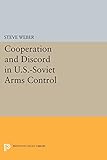Cooperation and Discord in U.S.-Soviet Arms Control / Steve Weber.
Material type: TextSeries: Princeton Legacy Library ; 166Publisher: Princeton, NJ : Princeton University Press, [2014]Copyright date: ©1991Edition: Course BookDescription: 1 online resource (344 p.)Content type:
TextSeries: Princeton Legacy Library ; 166Publisher: Princeton, NJ : Princeton University Press, [2014]Copyright date: ©1991Edition: Course BookDescription: 1 online resource (344 p.)Content type: - 9780691604367
- 9781400862436
- Game theory -- Soviet Union -- United States
- Game theory
- Nuclear arms control -- Soviet Union
- Nuclear arms control -- United States
- Nuclear arms control -- Soviet Union
- Nuclear arms control -- United States
- Strategic forces -- Soviet Union
- Strategic forces -- United States
- Strategic forces -- Soviet Union
- Strategic forces -- United States
- POLITICAL SCIENCE / International Relations / General
- 327.1/74 20
- JX1974.7
- online - DeGruyter
- Issued also in print.
| Item type | Current library | Call number | URL | Status | Notes | Barcode | |
|---|---|---|---|---|---|---|---|
 eBook
eBook
|
Biblioteca "Angelicum" Pont. Univ. S.Tommaso d'Aquino Nuvola online | online - DeGruyter (Browse shelf(Opens below)) | Online access | Not for loan (Accesso limitato) | Accesso per gli utenti autorizzati / Access for authorized users | (dgr)9781400862436 |
Frontmatter -- Contents -- Abbreviations -- Preface -- 1. Introduction -- 2. Current Approaches -- 3. Cooperation: A New Approach -- 4. Antiballistic Missile Systems -- 5. Multiple Independently Targetable Reentry Vehicles -- 6. Antisatellite Weapons -- 7. Conclusion -- References -- Index
restricted access online access with authorization star
http://purl.org/coar/access_right/c_16ec
If international cooperation was difficult to achieve and to sustain during the Cold War, why then were two rival superpowers able to cooperate in placing limits on their central strategic weapons systems? Extending an empirical approach to game theory--particularly that developed by Robert Axelrod--Steve Weber argues that although nations employ many different types of strategies broadly consistent with game theory's "tit for tat," only strategies based on an ideal type of "enhanced contingent restraint" promoted cooperation in U.S.-Soviet arms control. As a theoretical analysis of the basic security behaviors of states, the book has implications that go beyond the three bilateral arms control cases Weber discusses--implications that remain important despite the end of superpower rivalry. "An important theoretical analysis of cooperation between the U.S. and the Soviet Union in the area of arms control. An excellent work on a subject that has received very little attention."--ChoiceOriginally published in 1991.The Princeton Legacy Library uses the latest print-on-demand technology to again make available previously out-of-print books from the distinguished backlist of Princeton University Press. These editions preserve the original texts of these important books while presenting them in durable paperback and hardcover editions. The goal of the Princeton Legacy Library is to vastly increase access to the rich scholarly heritage found in the thousands of books published by Princeton University Press since its founding in 1905.
Issued also in print.
Mode of access: Internet via World Wide Web.
In English.
Description based on online resource; title from PDF title page (publisher's Web site, viewed 30. Aug 2021)


